Are you curious about the latest AI statistics and how they might affect your online business?
Artificial intelligence (AI) is impacting everything from how we shop to how we receive medical care. Even for small business owners and website owners, AI has become a powerful tool to enhance customer experiences, streamline operations, and gain a competitive edge.
But with so much happening in the field of AI, it can be tough to keep up with the latest trends and data. That’s why we have gathered the most surprising and insightful artificial intelligence statistics and research for you.
In this article, we will share the latest AI statistics to help you make informed decisions for your business.
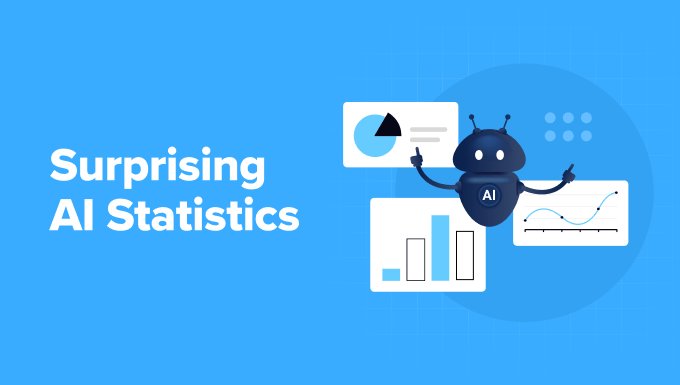
The Ultimate List of AI Statistics
Here are the top AI statistics we will be covering in this article. You can use the quick links below to skip to your preferred topic:
AI Market Size: Stats About Its Explosive Growth
First up, we will be looking at the impressive growth of the global AI market. These statistics will show you just how big it is today.
1. The global AI market is expected to hit a staggering $184 billion by the end of the year.
This is a 35% increase from the year before, which was around $135 billion.
To understand how big of a deal this is, imagine dividing $184 billion by the number of days in a year. That’s roughly $500 million spent on AI every single day.
What does this mean for you? For small business owners, that means more and more AI tools will be available to help you automate your tasks and save costs. You want to start mastering these platforms to gain a competitive edge and offer more value to your customers.
Pro Tip: Need some AI plugin recommendations? Check out our list of the best WordPress plugins using artificial intelligence.
2. In the US, AI-related investments are projected to contribute up to 4% to the GDP.
Let’s put that in perspective. With a US GDP of roughly $25 trillion, 4% translates to a significant $1 trillion annually.
For context, the US spends about $1.2 trillion on social security, which is roughly 5% of GDP. This means that AI investment could reach similar levels to a major government program.
3. The release of ChatGPT has led to a 58% increase in funding for AI startups.
In total, they were able to secure a whopping $754 in funding.
This surge may lead to a wave of new AI-powered services hitting the market soon. That means you will want to be prepared for new AI-driven solutions that might disrupt your industry. Stay informed about emerging AI trends to adapt and take advantage of them for your business.
For example, digital marketers are using AI to boost their lead-generation efforts. It’s also getting a lot more common to cut graphic design costs by using AI to generate images.
4. The global AI healthcare market is growing at a 37% rate.
Healthcare is leading the charge in AI adoption. And no, it’s not all about robot doctors.
Think smarter scheduling for appointments and surgeries, as well as automated administrative tasks that free up medical professionals’ time for patient care. These are just a few examples of how AI is making healthcare more streamlined and accessible for everyone.
5. China, India, and the UAE are leading AI adoption.
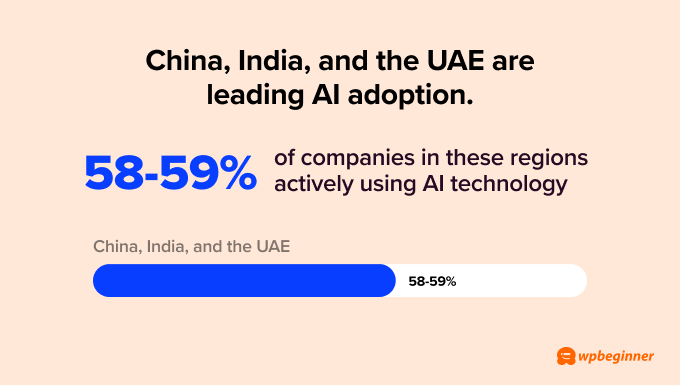
According to IBM’s research, China, India, and the UAE are at the forefront, with a whopping 58-59% of companies in these regions actively using AI technology.
This is in stark contrast to nations like Australia (29%) and France (26%), where the AI adoption rate is much lower.
More AI Market Size Statistics
- Global AI investment is expected to reach $200 billion by 2025.
- The market for AI-powered hardware and services is projected to hit $90 billion by 2025.
- Generative AI, a form of AI that can create content, is experiencing explosive growth, with a projected 42% annual growth rate (CAGR) over the next ten years.
- Forbes received 1,900 submissions for their annual AI 50 list this year, which is double the amount of last year, showcasing the surge in AI startups.
- The top 5 biggest AI companies are tech giants like Microsoft, Google (Alphabet), NVIDIA, Meta, and Tesla.
AI in the Real World: Usage Statistics
We’ve explored the impressive growth of the AI market, but how does this translate in the real world? Let’s dive into some AI usage statistics to see the impact of AI.
6. 52% of users report using generative AI more now than when they first started.
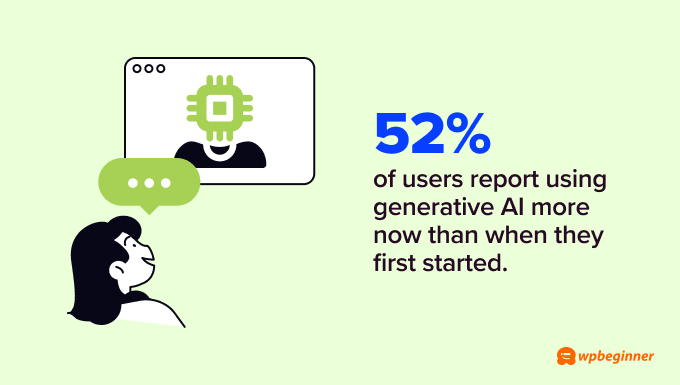
This data is from a Salesforce study of 8,000 respondents in the US, UK, Australia, and India. It doesn’t represent the entire population, but it does show how common the use of AI has become.
If you run a software business, then consider incorporating generative AI features into your offerings. This can make your product more user-friendly and appealing to customers.
For instance, SeedProd, a WordPress page builder, has an AI assistant to help users create engaging copy and generate images.
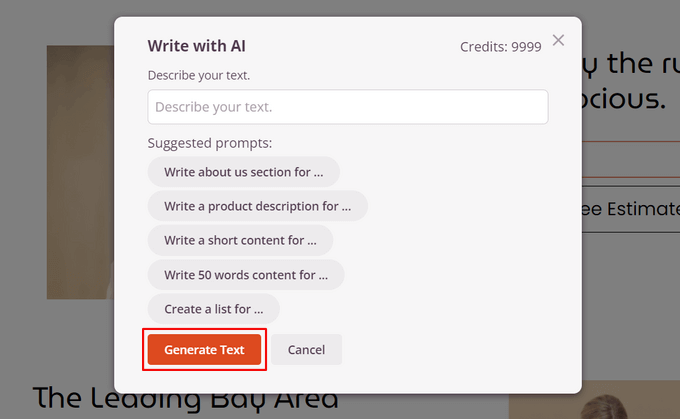
7. AI chatbots and AI writers are the most popular types of AI tools.
This isn’t surprising, considering the buzz around AI applications like OpenAI’s ChatGPT. That said, some users are not fans of its usage cap and slow performance when a lot of people are using the tool at the same time.
If you’re experiencing these issues, then you can check out our list of the best ChatGPT alternatives for bloggers and marketers.
Other notable players in this space include Gemini (formerly Bard) and Writesonic. They are just as good for creating content for social media or WordPress blog posts.
Not far behind text generation are image generators like Midjourney, video generators, music generators, and voice generators.
8. 62% of adult Americans use voice assistants.
These include tools like Amazon’s Alexa and Apple’s Siri.
The reason for this popularity? Convenience. 86% of smart speaker owners agree their devices make life easier by allowing them to complete tasks with just their voice.
But these tools go beyond that. For people with hearing disabilities, voice assistants can be a powerful tool for accessibility.
If you want to optimize your site for users with hearing disabilities, then you can add a voice search capability. For more information, check out our guide on how to add voice search in WordPress.
More Real-World AI Adoption Statistics
- 65% of users of AI content generation apps are Gen Z or Millennials.
- 72% of people using generative AI tools are employed.
- The top 50 AI tools globally have an average of 2 billion visits each month.
- Around 80% of traffic to the top 50 AI tools comes from people directly entering the website address.
- The average visit to an AI tool lasts roughly 12 and a half minutes.
- Only 11.4% of the traffic to the top 50 AI tools comes from organic searches.
- With 5.5 billion users, the US has the highest number of people accessing AI tools worldwide (about 23% of all global traffic to AI platforms).
- ChatGPT’s deep learning algorithms and natural language processing technologies (NLP) are estimated to cost around $700,000 per day to run.
- AI-powered Facebook post recommendations have driven a 7% increase in overall time spent on the social media network.
AI in Business: Use Cases and Statistics
Now that we’ve seen the surge in AI usage overall, let’s see how businesses are capitalizing on this technology.
9. 54% of companies now use AI in at least one function.
A recent McKinsey study found that 913 out of 1,684 companies across various regions, industries, and sizes now actively use AI.
The most common applications are marketing and sales, product development, and customer service. These areas directly impact your bottom line and revenue, so it’s no wonder businesses are embracing AI’s potential.
The takeaway for you? Don’t get left behind. As AI adoption continues to rise, your competitors may be using these tools to gain a significant edge.
10. Chatbots can save businesses up to $20 million globally.
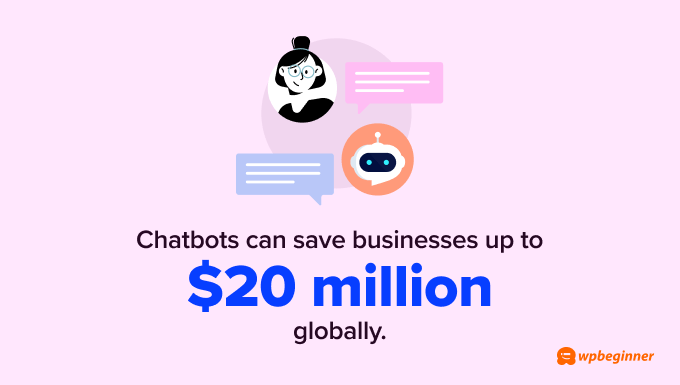
Customer service can be a time-consuming task, and hiring a team of support agents can be expensive. That’s why many businesses are turning to AI chatbots to improve their customer experience.
Chatbots offer a cost-effective solution to providing 24/7 customer support. They can answer frequently asked questions, streamline simple tasks, and even direct customers to the appropriate resources.
If you are interested in using chatbots, then we’ve created a tutorial on how to add a chatbot to your WordPress website.
11. On average, 42% of businesses report cost reductions of up to 20% with AI.
That’s a significant saving, but the benefits don’t stop there. 52% of businesses using AI also experience a revenue increase of up to 10%.
Manufacturing, service operations, and marketing and sales are seeing the most benefits. With such promising results, it’s no surprise that AI investments are expected to rise.
12. 40% of companies using AI expect to reskill over 20% of their workforce.
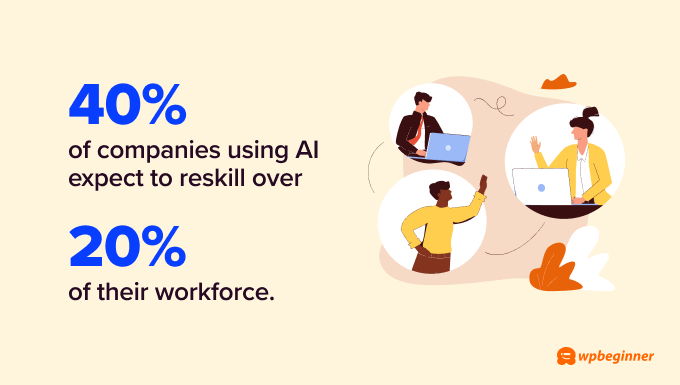
There’s been a lot of fear surrounding AI causing job losses due to automation. However, businesses are actually more likely to give AI training to their current employees to get them up to speed.
If you’re a freelancer, then it’s a good idea to learn the latest AI skills. Get familiar with the new technologies and AI systems that people usually use in your field so that you look more attractive to employers.
More AI in Business Statistics
- Small businesses can potentially save up to $35,000 per year by using AI.
- Over 40% of small businesses have used AI to automate tasks, allowing them and their employees to spend more time on more important activities.
- According to a Forbes Advisor survey, the most popular business use cases of AI are customer service (56%), cybersecurity (51%), and virtual assistants (47%).
- Business owners expect AI tools like ChatGPT to increase website traffic (57%), help them with decision-making (48%), and improve their credibility (47%).
- 82% of business leaders think using ChatGPT to draft messages to colleagues is acceptable.
- 42% of businesses think the biggest challenge of adopting AI is training employees to use it.
AI in Marketing: Key Statistics That Prove Its Success
One area where AI has proven successful is marketing. Let’s look at some popular ways and stats about how marketers are using AI.
13. On average, AI can save marketers around 2.5 hours per day.
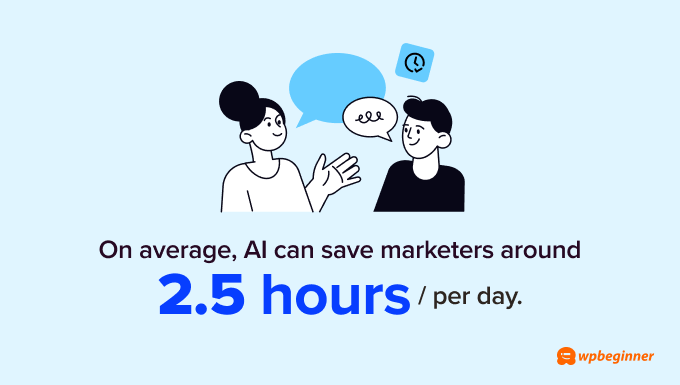
According to HubSpot, that translates to roughly 25-26 additional workdays per year. This frees up valuable time for marketers to focus on the more strategic aspects of their jobs, like planning, creative endeavors, and team management.
The good news is that you don’t need to be an AI expert to get started. Our guide on using AI to boost your marketing is a great starting point.
14. 53% of marketers use AI to generate content and make minor edits before publishing.
AI writing assistants are getting so good that many marketers only need to make minor edits before hitting publish.
But here’s the thing: AI is powerful, but it’s not a replacement for human expertise. While AI can churn out content quickly, it’s important to remember that it’s not perfect. AI-generated content can sometimes be inaccurate or reflect hidden biases in the data it uses.
Think of it this way. AI can help you write a blog post on the best coffee-making methods, but it can’t replace the knowledge and experience of a barista. Search engines value high-quality, informative content, and that often requires a human touch.
For more information, you can check out whether AI-generated SEO content is bad.
15. 25% of marketers use AI to generate product descriptions.
Writing product descriptions might seem straightforward, but it can be tricky. You need to highlight the features that will convince customers to buy, and it’s easy to get stuck in a rut using the same phrases over and over.
That’s where AI can be a helpful assistant. It can’t write perfect descriptions on its own, but it can be a great brainstorming buddy. AI can suggest ideas to get you started and even recommend persuasive phrases that resonate with your target audience.
Additionally, you can use AI to generate powerful headlines for your product landing pages. Check out our guide on how to use AI to write headlines for step-by-step instructions.
16. A clothing company increased conversions by 50% with AI-powered personalization.
Norrøna, a Scandinavian clothing brand, built a comprehensive, personalized recommendation platform using AI by analyzing customer data and using machine learning.
The results were impressive: a 187% increase in click-through rate and a 50% conversion boost, not to mention significant time saved on manual tasks.
Personalization doesn’t have to be complex. The secret lies in understanding your customers. By tracking customers’ journeys through your eCommerce website, you can gain valuable insights into their browsing behavior and preferences.
Once you understand your customers’ needs, you can suggest complementary products or collections through upsells and order bumps.
For example, if someone browses a ski jacket in your online store, then recommending matching ski pants is a natural cross-selling opportunity.
17. 44% of marketers think that using AI will have a positive impact on SEO, while 5% think the opposite.
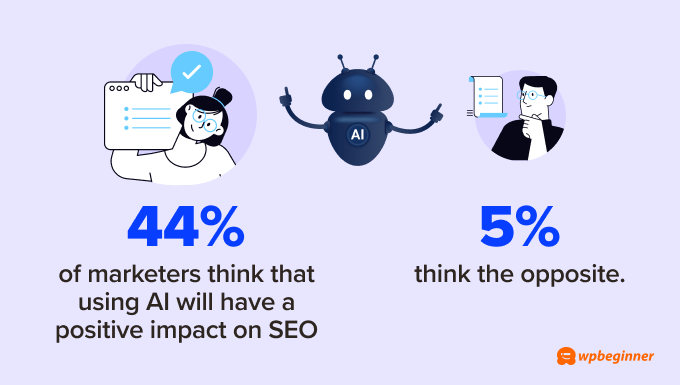
On the other hand, the majority (55%) think AI will not significantly affect their SEO strategy.
Ultimately, whether AI benefits your SEO efforts comes down to how you use it. For example, AI can suggest ways to improve your content or even mimic the way your target audience searches to help you target the right keywords.
However, it’s important to remember that AI is still under development. Double-checking information generated by AI, especially for research purposes, is very important.
For more information, you can read our guide on how to use AI to boost your SEO.
More AI in Marketing Statistics
- 9 in 10 businesses are using AI to personalize the customer experience.
- Over 60% of business leaders who personalize the customer experience report better customer relationships and retention.
- 21% of marketers use AI to summarize text into key points for repurposing content.
- 45% of marketers use AI to analyze their campaigns and turn that marketing data into easy-to-understand reports.
- 37% of marketers use AI to analyze their blog posts, helping them understand what’s working and what’s not.
- 28% of marketers leverage AI to generate email marketing copy.
- 31% of marketers use AI to create social media posts.
- 74% of marketers believe AI helps their content rank higher in search engine results pages.
- 84% of marketers say AI helps them create content that better matches what people are searching for online.
- Only 4% of marketers use AI to generate content without editing it themselves before publishing.
Expert Tip: Want to make the most of AI for your marketing strategy? Check out our ultimate list of ChatGPT prompts for bloggers, marketers, and social media professionals.
AI in Web Development: How Web Pros Use AI
AI is making waves in the world of web development with tools that can improve code, generate creative content, and even offer data-driven suggestions on how to design your WordPress website.
Let’s dive into the statistics to see how AI is impacting web development.
18. 93% of web designers use AI to design a website.
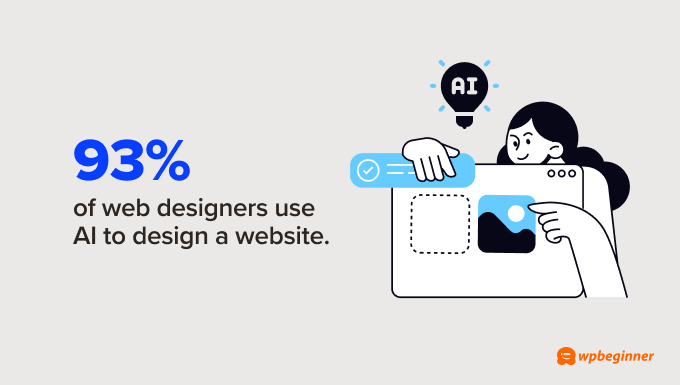
So, how are designers using this powerful tool? The HubSpot survey reveals some interesting trends.
Over half (58%) are using AI to generate images and other visual assets, saving them time in creating initial concepts. Surprisingly, 50% are using AI to create entire web page designs, although human expertise is still crucial for the final touches.
Even user experience (UX) is getting an AI boost, with 20% of designers using AI to identify potential usability issues and 40% to track user engagement.
19. 9 out of 10 digital agencies have saved up to $10,000 by using AI.
According to a survey by Duda, a website builder, AI is mostly used to update existing pages (59%), do content creation (55%), generate visuals for client websites (53%), optimize websites for search engines (40%), and even build entire websites (25%).
As the technology gets better, expect to see the number of agencies creating websites from scratch with AI get even higher.
If you run a digital agency, then AI should already be in your toolkit by now. AI lets you work faster, save money, and ultimately deliver even better results for your clients.
20. The AI website builder market is growing 32.9% per year.
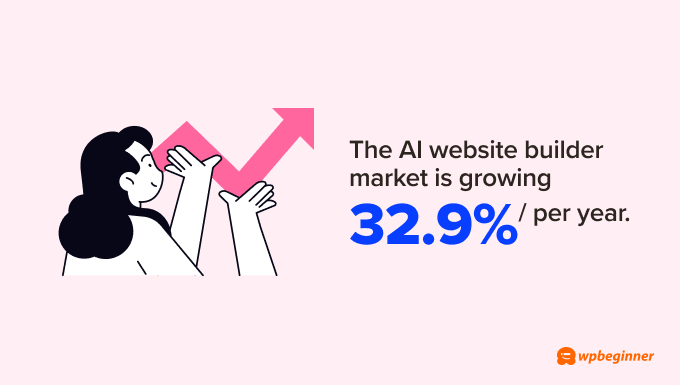
AI website builders are tools that let you create websites from scratch using AI. They’re easy to use for beginners and can save you tons of time.
Plus, AI website builders are often more affordable than hiring a web developer, making them ideal for small businesses.
SeedProd is a great example of a page builder with AI features. It can generate content and images in seconds and translate your website into multiple languages.

Besides that, Hostinger also has an AI-powered website builder you can check out.
21. Over 50% of users cannot spot AI-designed websites from human-made ones.
In a Sortlist study, respondents had to guess which websites were made by AI and which ones were built by humans. The AI-generated versions were so good that they fooled many participants.
If you’re considering using an AI builder, you don’t have to worry about your website looking unprofessional. Platforms like SeedProd offer a wide range of stylish, professional-looking templates that can help you create a website that impresses your target audience.
More AI Web Development Statistics
- 49% of web designers use AI to try out new ways to design their websites.
- 55% of web designers say they are encouraged to use AI by their clients or companies, and they have AI policies in place.
- Despite speeding up their work, 38% of web designers are slightly concerned about AI’s impact on their job security.
- The most popular AI tools among agencies are ChatGPT (53%) and Dall-E (47%).
- Most agencies measure AI’s success by how much it has saved them money (32%) and made business operations more efficient (26%).
Impact of AI: Expectations and Concerns
AI offers exciting possibilities, but it also raises some important considerations. Let’s look at the concerns and expectations surrounding the impact of AI.
22. Generative AI can contribute up to $4.4 trillion to the global economy.
That’s more than enough to buy every single person on Earth a brand-new smartphone.
Of course, we’re already seeing the benefits in real time, with AI-powered customer service tools and AI assistants that can generate entire code snippets for you based on your instructions. Expect the current generation of AI tools to become even smarter, faster, and more helpful.
23. Two-thirds of jobs could be partially automated by AI.
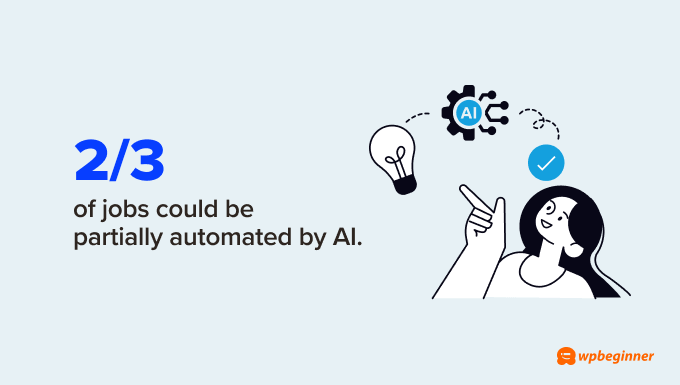
In other words, AI won’t completely cause job shortages, but it will help you do your job faster and more efficiently.
Additionally, one study by economist David Autor found that new technologies have always changed the job market. Apparently, 60% of today’s occupations didn’t even exist in the previous century.
24. AI advancements will create 69 million new jobs in the coming years.
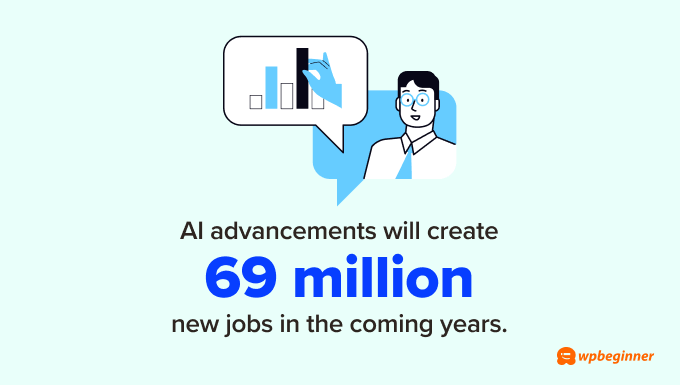
Yes, AI can handle repetitive tasks, but it’s not good at creativity, problem-solving, or emotional intelligence.
Take customer service, for example. AI chatbots can answer simple questions, but when it comes to complex issues or personalized service, human customer service reps are still irreplaceable.
That’s why business phone support services remain a popular support channel. This allows consumers to get direct assistance for complex issues that chatbots simply can’t provide.
25. 80% of users worry that AI is being used for cybersecurity attacks.
As AI is a relatively new technology, people are concerned about it being used for malicious purposes, such as identity theft and hacking.
Considering AI’s power, this concern is valid. That’s why governments are considering creating global regulations for AI development and use.
26. 22% of business leaders are concerned about data privacy when using generative AI.
One of the biggest drawbacks of using generative AI is that the prompts and data you provide might be used to train the AI model itself.
There’s a potential risk of this data being leaked or exposed, which could be a significant concern for businesses, especially those dealing with sensitive information.
For this reason, it’s important to be mindful of the data you use with generative AI tools. For highly sensitive information, it’s best to stick with tried-and-tested methods. However, for tasks that generate public-facing content, generative AI can be a valuable tool.
Pro Tip: Want to protect your WordPress site? Read our ultimate guide on how to secure WordPress for expert guidance.
More Impact of AI Statistics
- More than 40% of business owners worry about becoming too reliant on AI technologies.
- Up to 29% of customer service jobs in the US could be automated with chatbots.
- Only 21% of companies are mitigating the risks of using generative AI.
- A third of businesses are worried about AI giving misinformation to their employees or their customers.
- By 2025, 109% of automobiles are expected to have AI-driven, self-driving technologies.
Sources:
AiThority, Business Insider, Deloitte, Duda, Forbes, Global News Wire, Goldman Sachs, Hootsuite, HubSpot, IBM, McKinsey, Mitre, NPR, PWC, Precedence Research, Salesforce, Sortlist, Statista, Tech.co, Twilio Segment, Workable, and ZDNET.
We hope this ultimate list of AI statistics can help you make informed decisions about using AI for your business and projects.
Looking for more interesting statistics? Check out other research articles below:
More Statistics, Trends, and Research Articles
- Impressive eCommerce Statistics You Won’t Believe
- Social Media Statistics (Ultimate List for Bloggers)
- Influencer Marketing Statistics You Should Know
- Shopping Cart Abandonment Statistics (Expert Insights)
- Affiliate Marketing Statistics You Need to Know
- Creator Economy Statistics That Will Blow You Away
- Internet Usage Statistics and Latest Trends
- Ultimate Web Hosting Statistics and Market Share Report
- Blogging Statistics, Trends & Data – Ultimate List (UPDATED)
- Marketing Statistics, Trends, and Facts (Updated)
If you liked this article, then please subscribe to our YouTube Channel for WordPress video tutorials. You can also find us on Twitter and Facebook.





Syed Balkhi says
Hey WPBeginner readers,
Did you know you can win exciting prizes by commenting on WPBeginner?
Every month, our top blog commenters will win HUGE rewards, including premium WordPress plugin licenses and cash prizes.
You can get more details about the contest from here.
Start sharing your thoughts below to stand a chance to win!
Jabed Hossain says
This content is really helpful for me. Love you dear.
WPBeginner Support says
Glad it was helpful
Admin
uzoma ichetaonye says
On number 14 that talks about this: 53% of marketers use AI to generate content and make minor edits before publishing, such edits should not just be about altering some words and phrases but also include adding relevant images that illustrates the each paragraph text as well as telling your personal stories and experiences as well.
Infact, this case of adding stories is very key because it is what attracts the readers most who are wanting to learn from your experiences.
Finally, i have observe that AI is really taking over the space in certain fields of the internet especially in the area of doing online tasks. The only difference here is the accuracy angle which can only be done by humans.
Thanks WPbeginners for this fantastic AI statistics.
WPBeginner Support says
You’re welcome!
Admin
Jiří Vaněk says
An interesting point is the cost reduction by up to 20% thanks to artificial intelligence. This means that theoretically, artificial intelligence will gradually replace positions currently held by people, and it is possible that the tremendous development of artificial intelligence will also lead to massive layoffs from positions that will no longer be needed. At the same time, I would be interested in seeing statistics in the future that show the extent to which AI will affect website owners when they no longer use search engines as much and instead rely on chat bots. All of this will likely be revealed by the future and will be as interesting as these statistics.